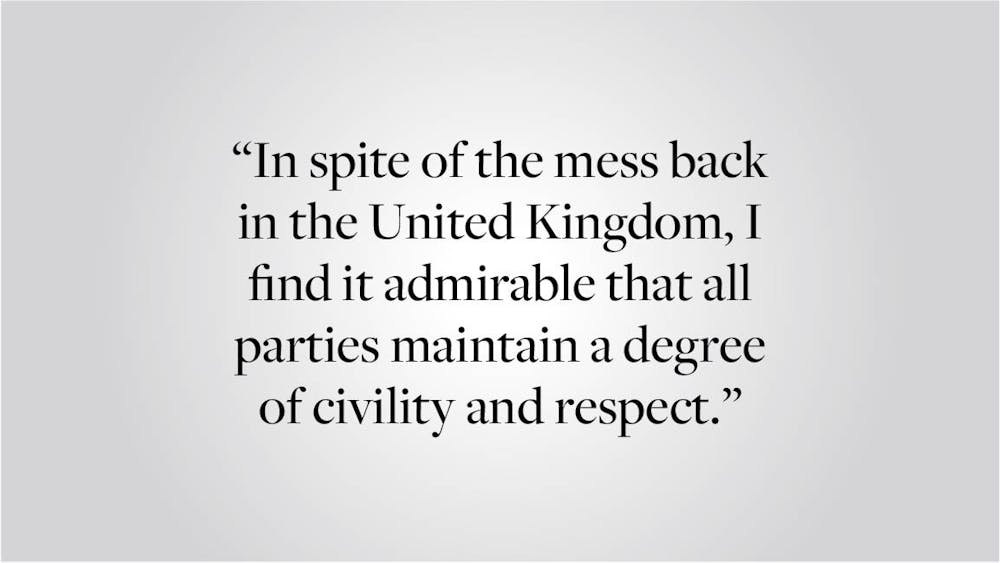Like most people in the U.S., my attention is focused on the results of the midterm elections. This year’s contest was particularly important, as, with results still pouring in, control of the Senate is uncertain. Given these events, my mind can’t help but compare the state of affairs in the United States. to life back home in the United Kingdom.
Similar to the United States, British politics have been chaotic, to say the least. We’ve had three different prime ministers in the last two months, with Liz Truss resigning after just 45 days in office. Many people across the pond are experiencing a cost of living crisis as energy bills rise. The pound has slumped in value, with the Bank of England forecasting a recession for the next two years. Labour party leaders are calling for a general election to unseat the incumbent Conservative government — although it’s unlikely that this will happen before 2025.
At the same time, in the U.S., the recent attack against Paul Pelosi, husband of Speaker of the House Nancy Pelosi, is the latest event in a saga of political violence that has engulfed the U.S. since last year’s Capitol riots. Moreover, former President Donald Trump, a deeply polarizing force, is expected to launch another bid for the presidency. It is clear that in both the United Kingdom and the United.States, internal conflict is as prevalent as ever.
However, the United Kingdom has been successful in certain areas where the United States has faltered. For instance, the United Kingdom has a sense of cultural unity that is lacking in the United States. On Sept. 8, former Prime Minister Liz Truss announced a relief package for those facing higher energy bills, leaving many concerned about the plan’s cost. That same day, the Queen died. Almost immediately, life in the United Kingdom stopped. Nothing else mattered. It didn’t matter what party you supported or where you came from — the next few weeks saw the country unite to honor the late monarch. To me, the most surprising part of the ensuing weeks was watching people line up for hours overnight just to pay their respects at the Queen’s coffin. At a time when many people in the U.K. struggle financially, so many still greatly admired someone so disconnected from the realities of ordinary life. This is a testament to the unified culture provided by the monarchy.
Britons aren’t just united culturally. Even the Labour and Conservative parties can find common ground on some issues. For example, the United Kingdom’s health care system is regarded as one of the best in the world. While some Conservatives would be happy to replace the state-provided healthcare system with a privatized system more similar to America’s, almost all U.K. voters are in favor of free, universal health care. Successful institutions in the political system are largely appreciated in the United Kingdom — providing common ground even amid policy divisions.
On the other hand, the attitude in the United States couldn’t be more different. The Capitol riots last year, which resulted from the refusal of Trump to accept the results of an election, showed how many within the United States question the fundamental principles of democracy. Culturally, Americans are becoming more and more divided over flashpoint issues such as abortion and gun control, while national pride has decreased in recent decades. With immense division even within the Republican and Democratic parties today, the United Kingdom’s tendency to find common ground is sorely missing in the United States.
Understandably, the two countries have significant political and cultural differences. The United States is a republic, while the United Kingdom is a constitutional monarchy, with the Church of England as its national religion. But in spite of the mess back in the United Kingdom, I find it admirable that all parties maintain a degree of civility and respect toward each other rather than engage in hostility.
Right now, it’s easy to feel hopeless and lose attention. Many in the United States, especially at Brown, are experiencing voter fatigue. But as national politics remain contentious, I would encourage people to stay politically engaged and support politicians who encourage stability and integrity. No matter what, politics will always be somewhat divided. But as political violence surges, finding common ground is more important than ever.
Taha Siddiqui ’24 can be reached at mohammed_siddiqui@brown.edu. Please send responses to this opinion to letters@browndailyherald.com and other op-eds to opinions@browndailyherald.com.





